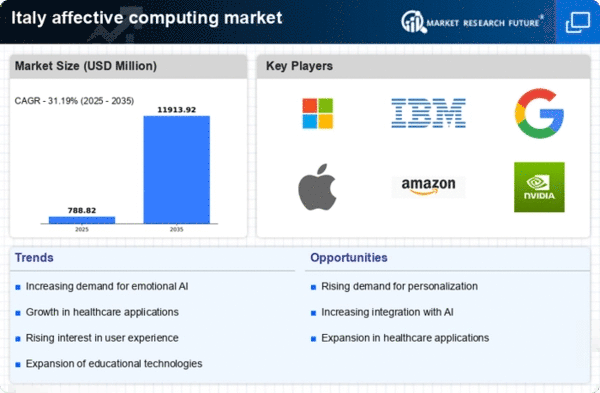Technological Advancements in AI
The rapid evolution of artificial intelligence (AI) technologies is a primary driver for the affective computing market in Italy. Innovations in machine learning and natural language processing enable systems to better understand and interpret human emotions. This capability is particularly valuable in sectors such as healthcare and customer service, where emotional intelligence can enhance user interactions. In 2025, the Italian AI market is projected to reach approximately €1.5 billion, indicating a robust investment in technologies that support affective computing. As businesses increasingly recognize the importance of emotional engagement, the demand for AI-driven solutions that can analyze and respond to human emotions is likely to grow, thereby propelling the affective computing market forward.
Increased Focus on Mental Health Solutions
The rising awareness of mental health issues in Italy is creating a fertile ground for the affective computing market. Technologies that can assess emotional states and provide insights into mental well-being are gaining traction among healthcare providers and consumers alike. The Italian mental health market is projected to grow by 10% annually, reflecting a heightened demand for innovative solutions that address emotional health. Affective computing tools can facilitate early detection of mental health conditions, enabling timely interventions. This focus on mental health not only supports individuals but also positions the affective computing market as a critical player in the broader healthcare landscape.
Rising Demand for Personalized Experiences
In Italy, there is a growing expectation among consumers for personalized experiences across various sectors, including retail, entertainment, and education. The affective computing market is poised to benefit from this trend, as technologies that can analyze emotional responses allow businesses to tailor their offerings to individual preferences. For instance, companies utilizing affective computing can create targeted marketing campaigns that resonate more deeply with consumers, potentially increasing conversion rates by up to 30%. This shift towards personalization is not merely a trend but appears to be a fundamental change in consumer behavior, driving the need for advanced emotional analytics tools within the affective computing market.
Government Initiatives Supporting Innovation
The Italian government is actively promoting innovation and technological advancement, which serves as a catalyst for the affective computing market. Initiatives aimed at fostering research and development in AI and emotional analytics are likely to enhance the competitive landscape. For instance, funding programs and partnerships with academic institutions are being established to encourage the development of affective computing applications. In 2025, government investments in technology are expected to exceed €500 million, indicating a strong commitment to advancing the digital economy. Such support not only stimulates growth in the affective computing market but also encourages collaboration between public and private sectors, fostering a vibrant ecosystem for innovation.
Integration of Affective Computing in Smart Devices
The proliferation of smart devices in Italy is significantly influencing the affective computing market. As more households adopt smart home technologies, the integration of affective computing capabilities into these devices is becoming increasingly common. For example, smart speakers and home assistants equipped with emotion recognition can provide more intuitive user experiences. The Italian smart home market is expected to grow at a CAGR of 15% from 2025 to 2030, suggesting a substantial opportunity for affective computing applications. This integration not only enhances user satisfaction but also fosters a deeper emotional connection between consumers and their devices, thereby driving growth in the affective computing market.
















